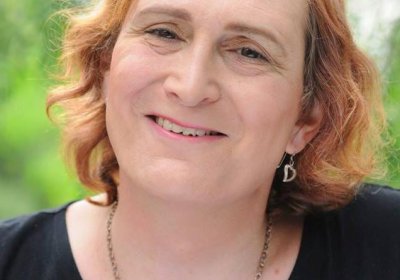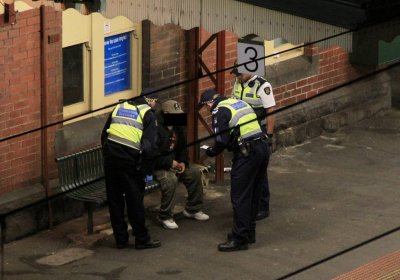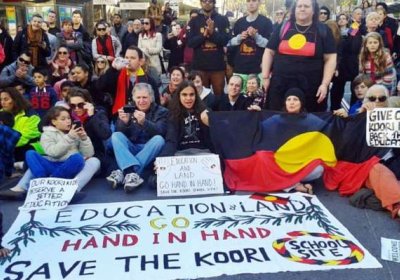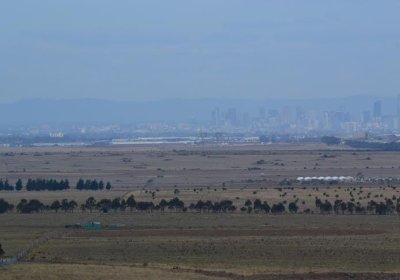Swastikas and white power slogans were sprayed onto a number of Indian-owned and other stores and restaurants in West Footscray, Melbourne, in the early hours of March 5.
However, within hours a team of volunteers appeared to scrub out Nazi symbols and slogans such as "white power" and "niggers must die" from Barkly Street shop and restaurant windows and fences.
Brett Long, who organised the clean-up, said he wanted to send the message that the local community overwhelmingly supported the businesses and those who ran them.
Naarm/Melbourne
More than a hundred people attended a public meeting in Coburg on March 10 to oppose the construction of residential towers, including a 19-storey tower, on the Pentridge prison site. Save Coburg organised the meeting.
A number of resolutions were passed at the meeting, including one to set up a community campaign group. This is a vital step as state government and local council have proved themselves incapable of defending the rights of the community on this issue and have allowed developers' greed to rule.
LGBTIQ activist Sally Goldner was inducted into the Victorian Women’s Honour Roll on March 7. The Honour Roll acknowledges and celebrates the outstanding achievements of Victorian women.
Goldner is the first trans woman to be inducted into the Honour Roll. She said: “It’s really affirming for myself and for trans and bi woman that this recognition has happened. To be in the company of such a diverse range of women is very empowering.”
On the evening of March 12, during Melbourne's Moomba festival, there was a disturbance involving crowds of young people around Federation Square.
One passer-by was hospitalised, and discharged later the same evening. Four youths were arrested: two for drunkenness, one for carrying a stun gun, and another for allegedly knocking a police officer's radio or phone into their face. Some tables and chairs outside cafes were overturned, and crockery smashed.
 Hundreds of people marched for International Women's Day in Melbourne on March 8.
Hundreds of people marched for International Women's Day in Melbourne on March 8.
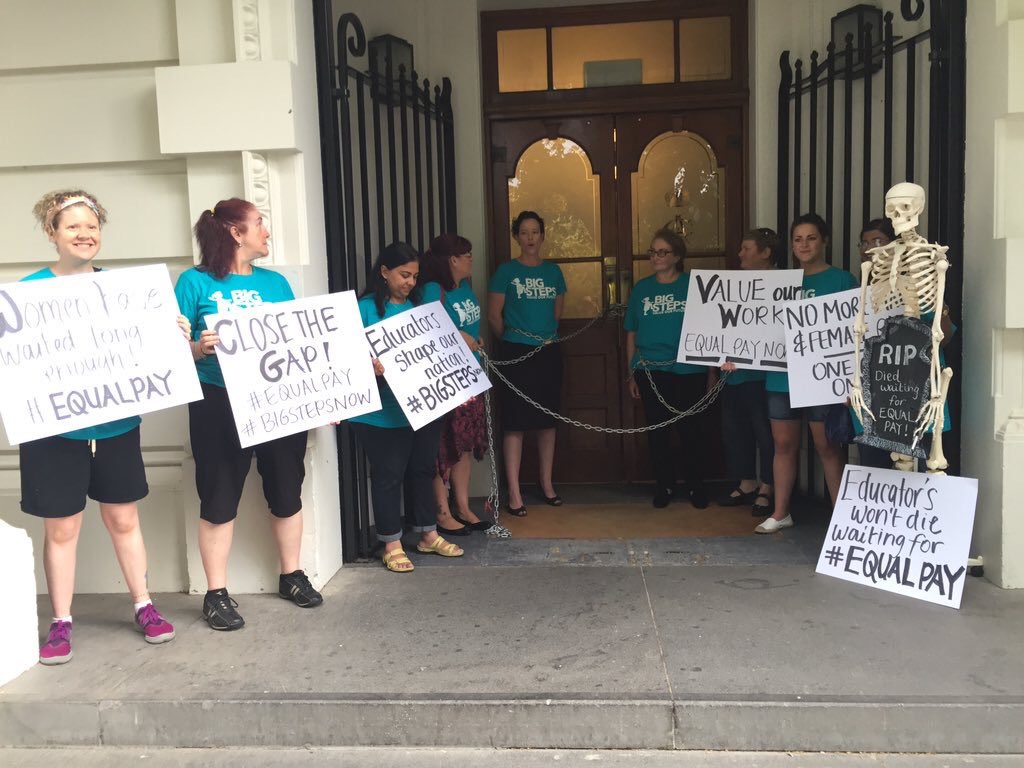 Childcare workers chained themselves to the entrance doors of Prime Minister Malcolm Turnbull's Melbourne office on International Women's Day, March 8 to demand better pay for the mainly women who work in the industry. The protesters said the 150,000 childcare workers nationally were "woefully" underpaid compared with other educators.
Childcare workers chained themselves to the entrance doors of Prime Minister Malcolm Turnbull's Melbourne office on International Women's Day, March 8 to demand better pay for the mainly women who work in the industry. The protesters said the 150,000 childcare workers nationally were "woefully" underpaid compared with other educators.
A meeting of 500 First Nations representatives voted on February 3 to reject Constitutional recognition and to begin talks on self-determination and a treaty with the Victorian government.
The proposed treaty would be a legal document covering Aboriginal affairs and services and addressing past injustices. It would be the first such agreement in Australia and follows similar arrangements with First Peoples in Canada, the US and New Zealand.
Dja Dja Warrung elder Gary Murray said the national debate around Constitutional recognition was just "a distraction".
Green Left Weekly hosted a forum on February 17: “After the Paris Climate Talks: Which way forward for the climate movement?”, with John Englart (citizen journalist, observer at Paris Talks); David Spratt (climate policy analyst, People's Climate March organiser) and me (Socialist Alliance and grassroots climate activist).
Paris Agreement
John Englart summarised the main parts of the Paris Agreement:
• A warming target of well below 2°C, with efforts to limit warming to 1.5°C;
 On February 18, a delegation of Victoria University staff and students delivered a letter to the office of Tim Watts, Labor MP for the federal seat of Gellibrand.
The letter, signed by 125 students and teachers — in only two days and before most students were back at university — pleaded with Watts to follow Premier Daniel Andrews' example and advocate that the 267 vulnerable asylum seekers, including 36 babies, not be sent back to Nauru.
On February 18, a delegation of Victoria University staff and students delivered a letter to the office of Tim Watts, Labor MP for the federal seat of Gellibrand.
The letter, signed by 125 students and teachers — in only two days and before most students were back at university — pleaded with Watts to follow Premier Daniel Andrews' example and advocate that the 267 vulnerable asylum seekers, including 36 babies, not be sent back to Nauru.
The sale of the former Ballerrt Mooroop Indigenous College site in Glenroy, Victoria has been put on hold indefinitely following a traditional owner settlement claim. Those campaigning to keep it in the public's hands are celebrating the decision, which makes the dream of turning it into a community hub a step closer.
Although about 99% of Victoria's volcanic plains grasslands have been destroyed by development, some outstanding remnants of this unique ecosystem persist, especially on the western fringes of Melbourne.
The grasslands ecosystem was listed by the federal government as critically endangered in 2008. But at the same time, the then-Labor government of Victoria was initiating an expansion of Melbourne's Urban Growth Boundary that would severely impact some of its best remaining areas.
The geologically recent volcanic activity across western Victoria created a landscape with rich, but often shallow, soils, that supported a unique grassland ecosystem.
Climate, soil, herbivory and fire history, among other factors, have combined to maintain tussock grasses, such as kangaroo grass, as a dominant species, with small herbs including diverse orchids, daisies and lilies growing in the spaces between tussocks and few or no trees over large areas.
- Previous page
- Page 62
- Next page


